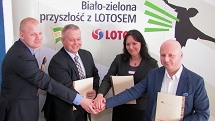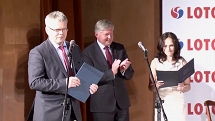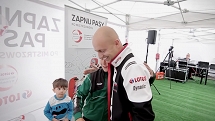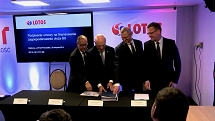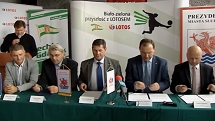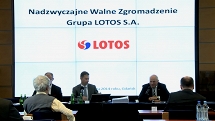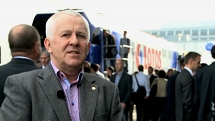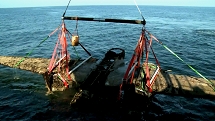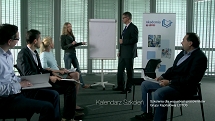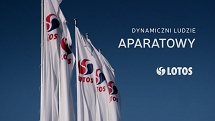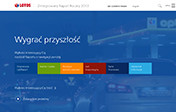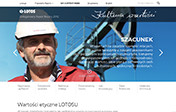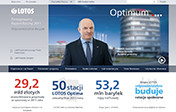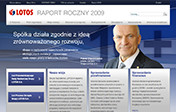-
Financial information
The past year ushered in a series of challenges for the companies in the fuel sector. The decisions made by us have demonstrated that we are able to take rapid steps to adapt to a demanding environment and ensure the desired profitability for our projects.
-
Segment performance
The segmental management model we have implemented enhances management efficiency, delivering cost and revenue synergies across the organization.
-
Letter from the Vice-President of the Board
2014 ushered in a series of challenges for the companies in the fuel sector. The decisions made by the LOTOS Group have demonstrated that we are able to take rapid steps to adapt to a demanding environment and ensure the desired profitability for our projects.
-
Business environment
The key factor that had a strong impact on both the global and Polish petroleum markets in 2014, with significant consequences for the LOTOS Group’s performance, was the price of crude oil, which also determined the price of petroleum products.
-
Strategic objectives
The LOTOS Group’s Strategy is designed to strengthen our position as a strong, innovative and efficient business which plays a major role in ensuring national energy security.
-
Business model
Our operations consist in crude oil production and processing, as well as wholesale and retail sale of petroleum products, among which are: fuels (unleaded gasoline, diesel oil and light fuel oil), heavy fuel oil, bitumens, aviation fuel, naphtha, propane-butane LPG and base oils.
-
Risk and opportunities
At the LOTOS Group, we identify a range of diverse risks, which may affect all areas of our business. The key risks in terms of their impact on our operations are the financial risks as well as risks affecting the exploration and production area. In the analysis of the risks, we also factor in issues related to sustainable development.
-
Key data 2014
With revenue of ca. PLN 28.5bn in 2014, we rank fourth in the group of 500 largest businesses in Poland.

Improvement of the organization
At the LOTOS Group, we strive to consistently improve our organization, for example by implementing a system for misconduct prevention. The system was developed based on ‘Managing the Business Risk of Fraud: A Practical Guide’ – a manual prepared by professional organizations dedicated to preventing and detecting misconduct, such as the Institute of Internal Auditors, the American Institute of Certified Public Accountants, and the Association of Certified Fraud Examiners.
We strive to ensure an optimum degree of immunity to misconduct within the LOTOS Group. Immunity to misconduct is achieved by companies which utilise their awareness of real and perceived misconduct threats arising in the course of their operations to implement and apply the solutions that are best adapted to the scale and nature of the risk, and that are geared towards preventing, detecting and responding to such threats.
The purpose of these efforts is to secure the organization’s ability to:
- Mitigate the risk of misconduct,
- Reduce the harmful effects of misconduct,
- Mobilise resources to accelerate the organization’s return to its pre-misconduct state.
The implementation of the comprehensive misconduct risk management system was confirmed as a valid course of action by the Association of Certified Fraud Examiners in its 2012 Report to the Nations, which presented the results of research into the nature and scale of occupational misconduct (fraud) in individual industries. Oil and gas companies rank fourth in terms of losses incurred as a result of individual cases of occupational misconduct and second in terms of the number of corruption incidents. The latter accounted for some 50% of all misconduct cases. The Report also explores various misconduct detection methods, highlighting the importance and effectiveness of internal auditing procedures and independent reviews carried out by management staff. Such efforts are essential components of a well-designed and effective misconduct prevention system.
Therefore, the Enterprise Risk Management system covers the risk of misconduct, understood as the risk of an intentional act or omission which constitutes a violation of the generally applicable laws, committed to secure an unlawful gain or leading to the Company sustaining a loss (including any forms of corruption).
Increasing our organization’s immunity to misconduct by 2015 is part of the key objective of the LOTOS Group’s Corporate Social Responsibility Strategy. This objective is to improve management by ensuring ethical conduct and transparency of business processes, as well as protecting the organization against the risk of irregularities that may threaten its operations. We plan to achieve this through our Ethical Conduct Programme and Misconduct Risk Management Programme. By pursuing these programmes effectively and comprehensively, we intend to safeguard the Company’s reputation and assets, as well as to ensure that our decisions are effective and the Company value is consistently enhanced.
The Ethical Conduct Programme covers initiatives aimed to encourage the LOTOS Group’s employees to behave in accordance with the appropriate ethical culture. The Misconduct Risk Management Programme, directed primarily at the management staff, consists in the coordination of misconduct prevention and detection measures implemented as part of individual business processes.
Ethical Conduct Programme
In effect since the beginning of 2013, the LOTOS Group’s Code of Ethics is the cornerstone of the organization’s comprehensive Ethical Conduct Programme, designed to make business ethics the highest standard in corporate management. Apart from ethics education and communication initiatives, the Programme comprises channels for reporting violations of the Code of Ethics, and institutions − the Ethics Board and Ethics Officer − whose duty is to uphold the accepted standards of ethical conduct. Established in 2013, the Ethics Board is a collective body composed of representatives of the organization’s business segments. The Ethics Officer, who, like the Ethics Board, is not remunerated for this role, was first appointed in June 2014.
One of the Ethics Board’s key tasks in 2014 was to set the criteria based on which the Ethics Officer would be appointed and to provide recommendations in this respect to the President of the Board of Grupa LOTOS. Importantly, throughout the process the Ethics Board was engaged in consultation with LOTOS Group employees, who decided that the Ethics Officer should be elected from within the organization. In collaboration with the newly appointed Ethics Officer, the Ethics Board also prepared an internal regulation detailing rules whereby the Ethical Conduct Programme would be implemented within the LOTOS Group. As a result, each of the Programme’s components is subject to very specific regulations, which encourages trust in and enhances transparency of the methods used to promote ethical conduct within the organization. In addition, periodic reports about the Programme’s performance and information on activities taken by the Ethics Officer are communicated to all employees.
The Ethics Officer, alongside members of the Ethics Board, is responsible for actively fostering an organizational culture based on ethical values and the rules of conduct set out in the LOTOS Group’s Code of Ethics.
The Ethics Officer’s responsibilities within the organization are to:
- clarify doubts regarding the provisions of the Code of Ethics, by responding to any submitted questions and issues;
- help resolve any issues submitted by employees to their line managers;
- maintain procedures for accepting and investigating reports of breaches of the Code of Ethics;
- consider employee proposals of amendments to the Code of Ethics;
- share the knowledge of any breaches of the Code of Ethics and measures taken to address such breaches with parties from inside and outside the organization.
The newly appointed Ethics Officer’s priority is to hold direct meetings with employees. In 2014, within the first six months of the appointment, the Ethics Officer held 27 such meetings, with some 1,000 employees (approximately 20% of the LOTOS Group’s total headcount). Reports from these meetings were made available through corporate media, attracting considerable interest. Questions and doubts raised during the meetings, as well as in telephone calls and letters addressed to the Ethics Officer, were answered on an ongoing basis. In the first months following the appointment, 49 cases were submitted to the Ethics Officer, more than a half of which were requests for an explanation, opinion or interpretation and reports of potential violations. The submitted reports and queries concerned in particular:
- communication between superiors and employees,
- the procurement process,
- potential conflicts of interests,
- employee matters,
- labour relations at LOTOS service stations.
Those who approached the Ethics Officer received feedback as to the correct interpretation of the Code of Ethics, including rationale for the position adopted by the Ethics Officer. Relevant remedial measures were recommended in those cases where a breach was confirmed.
STATEMENT
While the majority of LOTOS employees believe an ethics culture is important in their everyday work, nearly half of them regard the existing standards of ethical conduct as insufficient. Further efforts to improve our corporate practices in this respect are therefore necessary.
Marta Zbucka
LOTOS Group Ethics Officer, Corporate Contracting Office Head,
Grupa LOTOS

Most importantly, an appropriate ethics culture must be promoted through each employee’s own behaviour, regardless of their position and place of work. Employees of the LOTOS Group agree they should react to unethical behaviour of their colleagues. Expected to set an example, the management staff play a particularly vital role in promoting desirable conduct.
Talking to employees is the most important part of my responsibilities. They should know the Ethics Officer so they can ask for advice and report problematic incidents without hesitation. In the first months of serving as the Ethics Officer, I started to hold meetings on an ‘open door’ basis in Grupa LOTOS and organised regular meetings devoted to specific issues in individual companies. At all times, direct contact with the organization’s employees at their place of work was of key importance. It is our common goal to ensure a positive working environment, which naturally draws my attention to issues that particularly concern employees.
At the same time, a large portion of my efforts is focused on relations with the organization’s external stakeholders. Areas that need to be supported in the course of our ethics education include the supply chain and the effect of our ethical standards on relations with our trading and social partners. Also, what needs to be communicated more clearly is how important ethical conduct is to the LOTOS Group in its contacts with trading partners, including those managing LOTOS service stations.
For me, the Code of Ethics is the starting point and mainstay of my duties as the Ethics Officer. I believe it is particularly important to maintain the atmosphere which we created during the first year following adoption of the Code of Ethics by the Board of Grupa LOTOS, and to ensure that the principles and values contained in the Code of Ethics are cultivated in our day-to-day work and become a hallmark of the LOTOS Group’s market conduct.
Selected methods of contacting the LOTOS Group Ethics Officer
- telephone call or voicemail (+48 58 308 80 70);
- email to: liniaetyki@grupalotos.pl;
- online form available from: www.lotos.pl;
- open door policy (Thursdays, from 13.00 to 14.30 PM);
- traditional mail to: Rzecznik ds. etyki (Ethics Officer), Grupa LOTOS S.A., ul. Elbląska 135, 80-718 Gdańsk, Poland.
Misconduct Risk Management Programme
We have prepared and communicated a misconduct prevention policy and appointed persons coordinating and responsible for misconduct prevention activities. Channels for reporting suspected misconduct were established, alongside organizational arrangements and processes (suspected misconduct report database, investigation and reporting system, rules of explanatory proceedings).
The channels dedicated to reporting suspected misconduct are available to all employees, as well as external stakeholders. According to the Misconduct Prevention Policy, every LOTOS Group employee is obliged to immediately report any such suspicion.
In 2014, we launched a project to precisely asses the risk of misconduct within the organization. The project included a survey carried out among management staff, workshops and training sessions designed to increase awareness of certain threats, and overview of defined misconduct categories to identify process gaps.
In line with the adopted Corporate Social Responsibility Strategy for 2014–2015, we are taking steps to extend the misconduct risk management process across the entire LOTOS Group. Furthermore, we monitor all media for signals of alleged misconduct in the Company, as well as identify irregularities and incidents of misconduct in other companies, particularly those operating in the same industry as we do.
As part of the misconduct prevention system, we conduct periodic assessments of the organization’s immunity to misconduct. In line with the adopted method of managing misconduct risk, set out in the Enterprise Risk Management Policy, such assessment is carried out at least once every three years. In the first assessment, conducted in 2013, we examined the risk of corruption. In line with the adopted methodology, the heads of individual organizational units were asked to comment on all processes in place at the Company. Companies of the LOTOS Group were not subject to the assessment. One of the expected effects of the current Misconduct Risk Management Programme is to enable a group-wide evaluation of the organization’s immunity to misconduct. The first such assessment is to be carried out after the end of 2015.
| Business units of the LOTOS Group assessed for corruption risk in 2013 | |
|---|---|
| Total number of units | 15 |
| Percentage of units subject to assessment | 7% |
Furthermore, education and awareness initiatives were undertaken among management staff, focusing on misconduct prevention and the relevance of the system. The purpose is to educate them about losses and risks the organization may incur due to misconduct, how misconduct is committed, as well as how it can be identified and prevented. In 2014, training courses covered computer crime and data theft, and workshops were held on misconduct risks, including risk of corruption in the procurement process.
Percentage of employees trained in the organization’s anti-corruption policies and procedures
| Position type | 2012 | 2013 | 2014 |
|---|---|---|---|
| Grupa LOTOS | |||
| Management positions | 62.5 | 32 | 77 |
| Other | 5.7 | 7 | 3.8 |
| LOTOS Group | |||
| Management positions | - | - | 54 |
| Other | - | - | 4.3 |
In 2014, there was no single dismissal or disciplinary action at the LOTOS Group on charges of corruption, nor were there any instances of a business contract not being renewed because of a breach of the anti-corruption rules.
In line with the adopted Corporate Social Responsibility Strategy, 2015 will see continued efforts in this area, directed at the management staff and other employees, both in Grupa LOTOS and its subsidiaries. The Misconduct Risk Management Programme’s progress is periodically reported to the Audit Committee of the Company’s Supervisory Board.
STATEMENT
For the last two years, the LOTOS Group has been undertaking comprehensive actions in order to shape an appropriate ethics culture across the entire organization. The Ethical Conduct Programme we have put in place in 2013 has allowed us to build a strong foundation for the system protecting our organization from the risk of misconduct.
Beata Ossowska-Lango
President of the Ethics Committee of the LOTOS Group, Internal Audit Office Director, Grupa LOTOS

However, one should bear in mind that in this day and age no company is completely immune to such risk.
The practice proves that the best and most effective way of managing the risk of misconduct is to create an effective and comprehensive misconduct prevention system which is deeply rooted in the maturity of the organization’s management processes. It is one of the premises which guides us in our efforts to build appropriate awareness within this area through educational and preventive actions addressed to our employees and their superiors.
Our objective is, first and foremost, to sensitize our management staff to threats connected with misconduct as it is them who play the most important part in creating adequate corporate governance processes and shaping a desired organizational and ethics culture in the organization.
During numerous meetings with employees, representatives of Management Boards of the LOTOS Group companies confirm their zero tolerance towards any kinds of misconduct and stress their willingness to broaden their knowledge about its symptoms and responsibility stemming from the obligation to report and react to any irregularities observed. They also emphasize that equally important is the awareness of employees and alerting them to any indications of misconduct in everyday processes, as our constant alertness and non-routine approach to them are the best protection from threats to the company’s business. As an organization, we keep learning how to quickly and adequately react to the risk of misconduct, among others thanks to an effective flow of information, greater openness in talking about what can happen to us and formulating conclusions for future based on what we can observe on the market.






